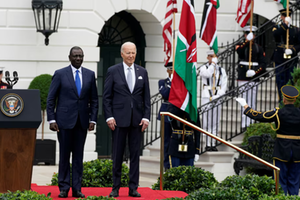Controversy rocks imports inspection tenders by Kebs

Second-hand cars being offloaded from a cargo ship at the port of Mombasa on July 7, 2021. The Kenya Bureau of Standards still facing challenges related to procurement of inspectors of products in foreign countries before they get shipped to Kenya.
What you need to know:
- Local, international and oversea firms have been scheming against one another and dragging Kebs to courts.
- The inspection contract involves ensuring products or goods coming to Kenya meet the regulations and quality requirements before shipment.
The Kenya Bureau of Standards (Kebs) is still facing challenges related to procurement of inspectors of products in foreign countries before they get shipped to Kenya.
This comes more than six years after it rolled out the programme. Local, international and oversea firms have been scheming against one another and dragging Kebs to courts and the Public Procurement Administrative Review Board (PPARB) as they seek the pre-export verification of conformity (PVOC) tenders.
Legal documents show that Kebs has also been put on the spot for failing to promote the principle of transparency and accountability in public procurement.
In a recent case, the agency had to repeat the procurement process to disclose to a losing foreign bidder why its tender was deemed not to have met the minimum technical requirements.
According to the law, the accounting officer of a public entity is responsible for ensuring compliance with the Public Procurement and Asset Disposal Act on anything touching on public procurement. Regulations 2020 require Kebs to notify the unsuccessful tenderers, in writing, why their bids failed and, disclose to them the name of the successful bidder and the tender price.
The inspection contract involves ensuring products or goods coming to Kenya meet the regulations and quality requirements before shipment.
Unsuccessful bidders
Since December 2015, inspection has been covering all imports, including vehicles. The latest legal battle involves the decision by Kebs to float a restricted international tender on August 2, 2021, for 2021-24 standards services.
Kebs invited 25 firms but only 13 submitted their bids. At the evaluation stage, the tender was classified into 17 zones. The Evaluation Committee recommended the award to six firms found to have the highest evaluated royalty in each targeted zone.
They included Bureau Veritas, World Standardisation Certification & Testing Group (Shenzhen), TUV Austria Turk, and China Hansom Inspection & Certification. China Certification and Inspection Group won in two zones, while Societe Generale De Surveillance (SGS) won in 11 zones.
Two unsuccessful bidders lodged appeals at the PPARB, claiming the proceedings were conducted irregularly.
Intertek International Limited and TUV Nord Egypt, in separate appeals filed last month, also argued that Kebs had breached the Procurement Act and failed to uphold and promote principles of fairness, equitability, transparency and competitiveness as stipulated in the Constitution.
Intertek already operates the PVOC programme for Kebs in regions such as the UK; China, including Hong Kong and Taiwan; India; East Asia and the Middle East. But the tribunal chaired by Faith Waigwa threw out its appeal for being time-barred.
Tender document
The appeal was based on allegations such as Kebs’ decision to amend the tender document from the framework agreement.
It also accused Kebs of failing to spell out in the document the instructions on preparation and submission of the tender that ensure preference and reservation are applied and benefit citizen contractors.
According to the board, having received the tender document on August 9, 2021, Intertek was supposed to file the appeal within 14 days, meaning they ought to have filed the appeal on August 23 but did so on January 3, 2022.
It struck out the appeal for want of authority to hear and determine the allegations raised.
With regard to the appeal filed by TUV Nord Egypt, the board ruled that it was wrong for Kebs to fail to disclose reasons why its bid was deemed not to have met the minimum technical requirements. The firm was also not informed of its scores at the technical evaluation stage.
“This, we note, has hampered the applicant’s capacity to challenge the evaluation of its tender because it is not aware of which particular criterion it did not satisfy at the technical evaluation stage for it to specifically challenge the same, if need be,” said the board.





